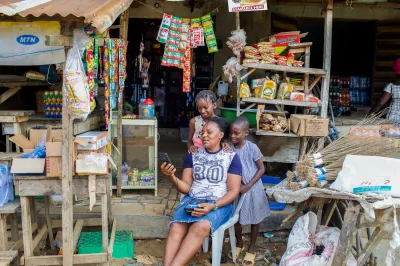Is Kenya Ready for an MVNO?
Kenya recently granted MVNO (mobile virtual network operator) licenses to three companies, allowing them to provide mobile money services without having to build new cellular infrastructure. To date, Safaricom has dominated the Kenyan mobile financial services space, but the new licenses could potentially shake things up. Equity Bank has already received a license, as have smaller companies like Tangaza Pesa, a mobile money transfer service, and Zioncell Limited, a technology company that offers value-add services to different MNOs across Africa. Nakumatt holding, the largest retail chain in Kenya also received an MVNO licence.
Will Equity be able to eat away at Safaricom’s massive customer base of more than 18 million customers? Or will Safaricom protect its position by improving services, cutting prices and opening up to third parties who want to use its platform? Just this week, Safaricom announced it is finally opening its M-PESA agent network and partnering with Kenya Commercial Bank (KCB) to offer services to SMEs. Are these moves potentially influenced by the intensifying competition? Aside from the wrangling of these giants, what will be the impact on customers and the market in general? From a financial inclusion perspective, there are several areas of potential impact.
Impact on Customers
- Pricing of financial services. Each MVNO will be able to determine their own pricing of services such as data, voice and SMS, which they previously had to negotiate with MNOs. This could lead to lower prices as firms compete for market share. Equity has already said that it will charge a maximum cap of 25 shillings per transfer (M-PESA’s cap is 110 shillings).
- A surge of product innovations. The market will likely experience a new wave of innovation through the different products and services each MVNO develops for the market. Until now, these firms have had to use the existing MNOs’ channel, which means facing challenges such as network outages and high-cost USSD sessions. With MVNO licences, the players will be able to innovate and roll out their own products and services that will not be reliant on the existing MNOs.
- Increased digital financial services uptake. The new MVNOs could also cause more customers to start using mobile financial services. However, the extent to which new customers come into the system versus a shift from one provider to another is difficult to predict.
- Customer service and customer experience. As MVNOs will have more control over their products and the channels through which they will be offered, they have an opportunity to design a better experience for customers.
From a provider perspective, the MVNO license also brings new revenue streams.
- New data, voice and SMS revenue opportunities. With the issuing of the licences, the three players will be able to tap into additional revenue through pricing of services - such as data, voice, and SMS - and also reduce the costs incurred by acquiring the same services from the mobile network operators.
- New financial product revenue opportunities. Through the additional channels now available to the MVNOs, they will have room to offer new products, which are likely to generate additional revenue.
- Lower barriers to entry stimulating market expansion. The MVNO licences cost KSHS 100,000 (approximately $1200) under the Application service provider segment as opposed to the huge cost that the mobile network operators have to pay to renew their licences and offer the same services. Back in 1999, Safaricom paid a total of $55 million for a 15-year licence, and the Communications Commission of Kenya has asked them to pay $27 million this year for a further renewal of the same licence. This wide difference in costs also raises some questions about whether this provides MVNOs an unfair advantage to MNOs, and has already resulted in an official complaint along these lines from Orange.
- New revenue streams for existing MNOs. Airtel stands to benefit from additional revenue due to the fact that it will be leasing out its unused capacity to the three MVNO’s.
Despite the upside potential for customers, there are a few key challenges which will need to be overcome.
- Lack of Network Capacity. The Communications Commission of Kenya 2012/2013 annual report highlighted that none of the mobile network operators in Kenya met the set quality standards for service. With Airtel supporting all the MVNO players on its infrastructure, it will be challenged to maintain a high quality of service.
- Short-term impact of a price war. The entry of the MVNOs could trigger a price war in the market as each tries to gain market share and face the likely resistance from the existing MNOs. A price war at this stage could complicate market dynamics by creating confusion as customers try to navigate a wide array of products with different features, pricing models, and standards of service.
- Unclear Regulator Model. The current regulation in Kenya is centred on mobile network operators as stand - alone business entities. With the entry of MVNOs, the operational dynamics are likely to change and become more complex with cross network services becoming a possibility. A separate regulatory structure may be needed to give the MVNOs a strategic framework to operate within.
We really don’t know which way the chips will fall and there is a small chance that Equity will be thwarted as Safaricom has challenged the security of its SIM overlay technology. We expect an exciting roller coaster ride beginning this month with Equity’s launch and will eagerly be tracking how this impacts financial inclusion in Kenya.




Comments
In my humble view this is a
In my humble view this is a phenomenon initiative that shall have telling impact within the mobile industry segment pertaining to money transfers among others.
As a micro finance practitioner our efforts to serve the clients efficiently and fairly fast is key,critical and need no further emphasis.It is not a question of availing the clients of what is found on/in the shelf but availing the clients the products and services that rightly resonate with their needs and expectations over time.
The above episode is bound,as rightly alluded, to generate vibrant and dynamic operational pathways,hopefully to accord the necessary service and satisfaction.
Above all we need to be prepared in handling if not harnessing the possible potential challenges that could emerge.
While access tariffs for most
While access tariffs for most of the availed products in mobile banking remain a significant determinant to uptake and use and therefore reduced tariffs would be welcome, the current debate on security of the the thin sim technology remains a very sensitive issue. Targeted populations for finacial inclusion are skeptical and not risk takers, its important that clear information accompanies the roll out to counter information that there is a possiblity of losing money through seapage of information in virture accounts held in current sim cards. In addittion convenience of availed services have significantly rated favourably with users (not withstanding the cost), however current piloting of new simcards through agents offering services has resulted to unreliablitity and the network capacity needs to be addresed urgently.
Add new comment